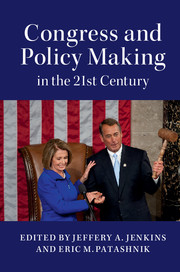Book contents
- Frontmatter
- Contents
- List of Figures
- List of Tables
- List of Contributors
- Acknowledgments
- 1 The Evolving Textbook Congress: Polarization and Policy Making on Capitol Hill in the 21st Century
- PART I CONGRESSIONAL POLICY MAKING IN A POLARIZED AGE
- PART II CONGRESS AND SOCIETY
- 4 Making a Rainbow Military: Parliamentary Skill and the Repeal of “Don't Ask, Don't Tell”
- 5 Who Votes for Inequality?
- PART III CONGRESS AND ECONOMIC POLICY
- PART IV CONGRESS AND DOMESTIC POLICY DILEMMAS
- PART V REFLECTIONS
- Index
- References
4 - Making a Rainbow Military: Parliamentary Skill and the Repeal of “Don't Ask, Don't Tell”
from PART II - CONGRESS AND SOCIETY
Published online by Cambridge University Press: 05 February 2016
- Frontmatter
- Contents
- List of Figures
- List of Tables
- List of Contributors
- Acknowledgments
- 1 The Evolving Textbook Congress: Polarization and Policy Making on Capitol Hill in the 21st Century
- PART I CONGRESSIONAL POLICY MAKING IN A POLARIZED AGE
- PART II CONGRESS AND SOCIETY
- 4 Making a Rainbow Military: Parliamentary Skill and the Repeal of “Don't Ask, Don't Tell”
- 5 Who Votes for Inequality?
- PART III CONGRESS AND ECONOMIC POLICY
- PART IV CONGRESS AND DOMESTIC POLICY DILEMMAS
- PART V REFLECTIONS
- Index
- References
Summary
When the Department of Defense was born in the late 1940s it arrived inside the cabinet with a significant prohibition: gay and lesbian citizens were not welcome to serve in America's armed forces (Bérubé 1990, 261). The United States then went on to operate an officially “straight” military well into the 21st century. Congress contributed greatly to such longevity. In 1993, after initial opposition from President Bill Clinton, Congress enacted the “Don't Ask, Don't Tell” statute (DADT). It codified the proscription on gay and lesbian service – and thus gave it new life. Congress indeed formalized the idea of a military closet. This 1993 statute recognized that many thousands of gays and lesbians bore arms but it held that their sexual orientation was inherently a threat to an effective military. Non-straight orientation was best kept secret. If a non-straight soldier were outed then the disclosure would lead to discharge.
After 1993 only a statute enacted by both houses of Congress and signed by the president could truly recast the status of non-straight personnel in the U.S. military. The road to a “rainbow” military ran through Congress. That road would be difficult to traverse. Members of Congress would have to instruct the military that the criteria for service were flawed. But recent research has shown that members of Congress respond to pro-gay opinion in their districts only when it is exceptionally high and vocal (Krimmel et al. 2012). The number of House districts and states that fit these criteria is small.
Not only would an unlikely congressional coalition for the repeal of DADT have to form, but repeal would also require a president willing and able to promote DADT repeal. Congress imposed DADT on an unwilling Commander-in-Chief, to be sure, but Congress would never dictate the reverse – that is, the repeal of DADT – to an unwilling president.
Thus lifting the statutory ban on gay and lesbian military service also depended on the Democratic party hitting the Madisonian jackpot – that is, on unified control of the federal government. Of the two parties Democrats were much more likely to respond to demands for repeal from LGBT advocacy groups. DADT was enacted during the previous instance of unified Democratic control, 1993–1995, and a Southern Democrat, Sen. Sam Nunn (D-GA), led the enactment.
- Type
- Chapter
- Information
- Congress and Policy Making in the 21st Century , pp. 75 - 105Publisher: Cambridge University PressPrint publication year: 2016



